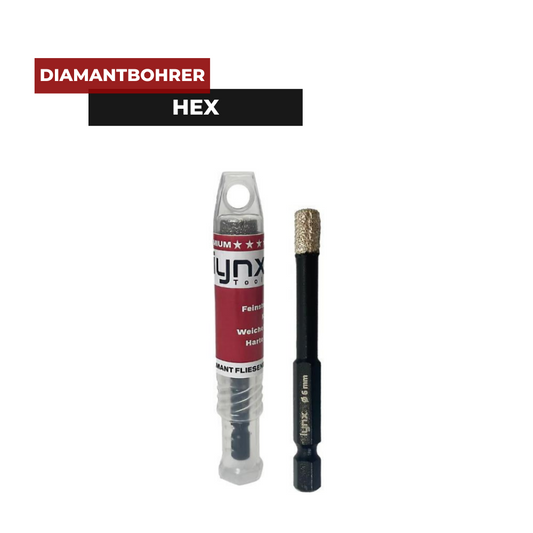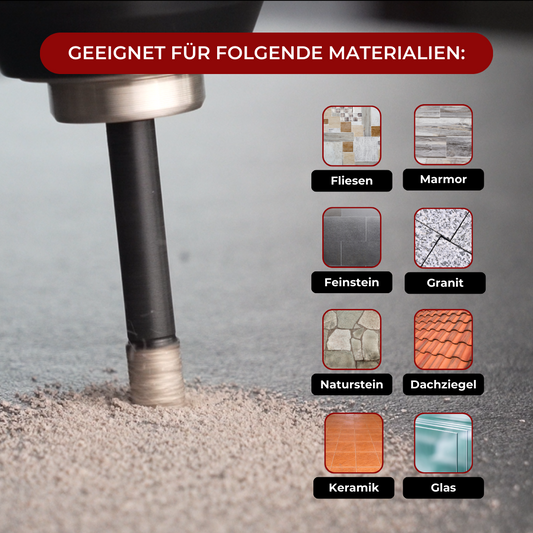Collection: Porcelain stoneware drill bit for drilling thick stoneware tiles & patio slabs
-
Diamond drill bits for cordless screwdrivers 5 mm - 14 mm
Regular price From €9,90 EURRegular priceUnit price / per
FAQ
Diamantbohrer Feinsteinzeug: Alles, was du wissen musst
Was ist Feinsteinzeug?
Feinsteinzeug ist eine Art von keramischem Bodenbelag, der durch das Brennen von Ton und anderen natürlichen Materialien bei sehr hohen Temperaturen hergestellt wird. Es ist bekannt für seine Langlebigkeit, Härte und Beständigkeit gegen Feuchtigkeit und Flecken. Aufgrund dieser Eigenschaften benötigst du zwingend einen Feinsteinzeugbohrer der in der Lage ist dieses harte Material zu bohren.
Eigenschaften von Feinsteinzeug
Feinsteinzeug zeichnet sich durch seine extrem hohe Dichte, geringe Porosität und hohe Festigkeit aus. Es ist auch kratzfest, rutschfest und sehr widerstandsfähig gegen Abnutzung und Chemikalien.
Vorteile von Feinsteinzeug
Einige Vorteile von Feinsteinzeug sind:
- Langlebigkeit und Haltbarkeit
- Geringe Wartung und einfache Reinigung
- Vielseitigkeit in Design und Stil
- Umweltfreundlichkeit
- Beständigkeit gegen Feuchtigkeit, Flecken und Chemikalien
Warum einen Spezialbohrer für Feinsteinzeug verwenden?
Ein Spezialbohrer für Feinsteinzeug ist in zwei Ausführungen erhältlich. Ein Hartmetall-Bohrer mit einer gehärteten Spitze oder ein Diamantbohrer mit einem Diamantsegment. Das sind unserer Meinung nach die einzigen zwei Varianten, die die besten Bohrlöcher bieten. Ein guter Feinsteinzeugbohrer sollte in der Lage sein, mehrere Bohrlöcher zu einem günstigen Preis pro Bohrloch setzen zu können.
Kostenvergleich: Diamantbohrer vs. Hartmetall-Fliesenbohrer für Feinsteinzeug
In diesem Kostenvergleich zeigen wir dir auf, dass trotz der höheren Anschaffungskosten für Diamantbohrer, diese auf lange Sicht kostengünstiger für das Bohren in Feinsteinzeug sind. Hartmetall-Fliesenbohrer verschleißen schneller und erfordern häufigere Ersatzkäufe, während Diamantbohrer eine längere Lebensdauer und weniger Verschleiß aufweisen.
Wir haben unsere iynx Tools Feinsteinzeugbohrer auf die Probe gestellt und die Kosten pro Bohrloch aus unserem Test in einer 2cm Feinsteinzeug Bodenfliese berechnet.
Feinsteinzeug Bohrer TypBohrlöcherKosten pro BohrlochFeinsteinzeugBohrer KaufpreisHartmetall-Fliesenbohrer 6 mm91,27€ 8,90 €Diamantbohrer für Feinsteinzeug 6 mm230,64€14,90€
Diamantbohrer sind daher die ideale Wahl zum Bohren von Feinsteinzeug aufgrund der Härte und Dichte des Materials. Hartmetall-Fliesenbohrer können leichter beschädigt werden.
Vorteile von Diamantbohrern beim Bohren von Feinsteinzeug-Fliesen und Terassenplatten
Diamantbohrer bieten eine Reihe von Vorteilen gegenüber herkömmlichen Bohrern, darunter:
- Höhere Schnittleistung und Geschwindigkeit
- Längere Lebensdauer und geringerer Verschleiß
- Saubere, präzise Bohrlöcher ohne Risse oder Splitter
- Geeignet für alle harte Materialien wie Feinsteinzeug, Granit und Beton
Unterschied zwischen Diamantbohrern und herkömmlichen Bohrern
Der Hauptunterschied zwischen Diamantbohrern und herkömmlichen Bohrern liegt in der Schnittkante. Während herkömmliche Bohrer aus Stahl oder Hartmetall bestehen, verfügen Diamantbohrer über eine Segment aus hochwertigen Diamantpartikeln. Dadurch sind sie härter und widerstandsfähiger gegen Verschleiß, was sie ideal für den Einsatz auf Feinsteinzeug und anderen harten Materialien macht.
Diamantbohrer-Arten und Verwendungszwecke beim Bohren von Feinsteinzeug
Es gibt verschiedene Arten von Diamantbohrern, die sich in ihrer Anwendung unterscheiden:
Trockenbohrkronen:
Trockenbohrkronen sind für das Bohren ohne Wasserzufuhr konzipiert. Sie eignen sich gut für schnelle Bohrungen und sind ideal für den Einsatz auf Baustellen, wo keine Wasserzufuhr vorhanden ist.
Nassbohrkronen:
Nassbohrkronen verwenden Wasser als Kühlmittel während des Bohrens. Sie eignen sich für äußerst präzise Bohrungen und reduzieren die Staubentwicklung. Nassbohrkronen für Fliesen sind nochmals deutlich teurer als Trockenbohrer.
Feinsteinzeug bohren mit der Bohrmaschine oder Winkelschleifer:
Feinsteinzeugbohrer sind für die Bohrmaschine (Akkuschrauber) oder den Winkelschleifer erhältlich. Hartmetall- und Diamantbohrer für Feinsteinzeug mit 5 mm - 14 mm Durchmesser sind für beide Maschinen erhältlich. Für größere Bohrungen ab 16 mm bis 130 mm musst du den Winkelschleifer verwenden.
BohrerDurchmesserMaschineHex Feinsteinzeugbohrer5 mm, 6mm, 8 mm, 10 mm, 12 mm, 14 mmBohrmaschineHex Diamantbohrer5mm, 6mm, 8mm, 10mm, 12mm, 14mmBohrmaschineM14 Feinsteinzeug Diamantbohrer16 mm - 130 mmWinkelschleifer (Flex)
Die richtige Diamantbohrer-Größe wählen
Um die richtige Diamantbohrer-Größe für dein Feinsteinzeug-Projekt auszuwählen, solltest du die Dicke des Materials und den erforderliche Größe des Lochs berücksichtigen. In der Regel ist die benötigte Bohrgröße auf der Verpackung des Gegenstands montiert, dass du anbringen möchtest.
Tipps und Tricks beim Bohren von Feinsteinzeug
Die richtige Drehzahl verwenden:
Die optimale Drehzahl für das Bohren von Feinsteinzeug variiert je nach Größe des Bohrers und der Härte des Materials. Im Allgemeinen solltest du mit einer niedrigeren Drehzahl beginnen und diese bei Bedarf erhöhen. Jeder Bohrtyp hat seine eigene empfohlene Drehzahl. Bitte schaue dir empfohlene Drehzahlen auf der Produktdetailseite oder der Verpackung an.
Reibung erzeugt Wärme. Insbesondere bei harten Materialien wie Feinsteinzeug. Achte darauf den Bohrer nicht zu heiß werden zu lassen. Es wird für Feinsteinzeugbohrer mit einem Hartmetall oder Diamantsegment empfohlen, maximal 30 Sekunden am Stück zu bohren. Du kannst diesen in der Bohrpause von mindestens einer Minute abkühlen lassen oder den Bohrer in eine Schüssel von Wasser tauchen.
Schutzmaßnahmen:
Trage beim Bohren von Feinsteinzeug immer geeignete Schutzkleidung, wie Sicherheitsbrille, Gehörschutz und Atemschutzmaske, um sich vor Staub und Splittern zu schützen. Eine gute Beleuchtung hilft dir dabei präzise zu bohren.
FAQs
1. Kann ich einen herkömmlichen Bohrer für Feinsteinzeug verwenden?
Es wird nicht empfohlen, herkömmliche Bohrer für Feinsteinzeug zu verwenden, da sie leicht beschädigt werden oder das Material beschädigen können. Diamantbohrer sind die beste Wahl für das Bohren von Feinsteinzeug.
2. Wie tief kann ich mit einem Diamantbohrer in Feinsteinzeug bohren?
Die maximale Bohrtiefe hängt von der Länge des Diamantbohrers und der Dicke des Materials ab. Achte darauf, einen Bohrer mit ausreichender Länge für dein Projekt auszuwählen.
3. Wie lange hält ein Diamantbohrer?
Die Lebensdauer eines Diamantbohrers hängt von verschiedenen Faktoren ab, wie der Härte des Materials, der Bohrgeschwindigkeit und der Kühlung. Bei sachgemäßer Verwendung und Pflege kann ein Diamantbohrer jedoch viele Bohrungen durchführen, bevor dieser ersetzt werden muss.
4. Muss ich beim Bohren von Feinsteinzeug immer Wasser verwenden?
Nicht unbedingt. Es gibt sowohl Trocken- als auch Nassbohrkronen für Diamantbohrer. Nassbohrkronen verwenden Wasser zur Kühlung, während Trockenbohrkronen ohne Wasserzufuhr arbeiten können. Die Wahl hängt von der Anwendung und den Arbeitsbedingungen ab.
5. Kann ich Diamantbohrer auch für andere Materialien verwenden?
Ja, Diamantbohrer eignen sich auch hervorragend zum Bohren anderer harter Materialien wie Granit, Marmor, Beton und Glas. Achte darauf, die richtige Art von Diamantbohrer und die geeignete Drehzahl für das jeweilige Material auszuwählen.


